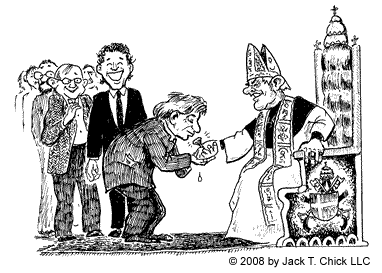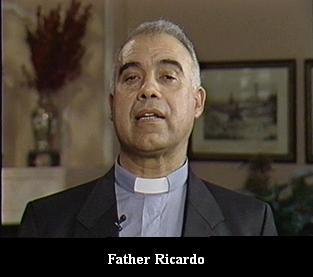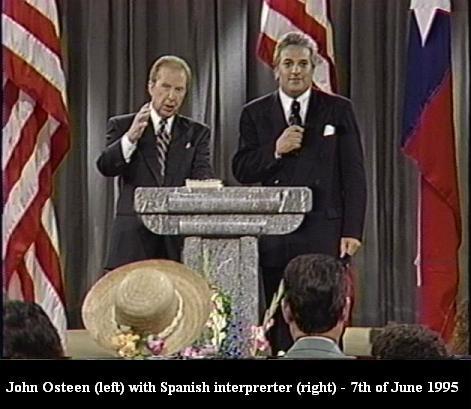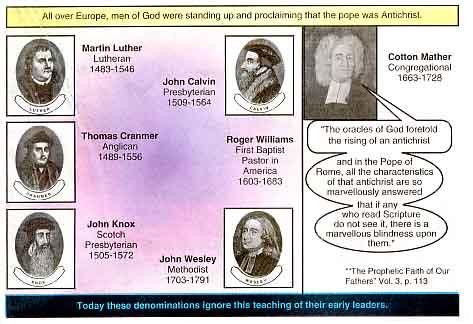Joel “Ecumenical” Osteen
![]()
| Ecumenical = One World Religion |
 Chick Publications - "www.chick.com"” |
 |

![]()
|
- Joel Osteen's Perversion - (Download MP3) |
- Hell Awaits Them! - (Download MP3) |
Testimony Of A Former Lakewood Church Member
By Alan Richardson - 9/18/2008
 I was a member of Lakewood Church during the years of 1994-1998 when John Osteen was the pastor. On the 7th of June 1995, John Osteen welcomed Charismatic Catholic priest Father Ricardo who promoted the Catholic “Charisma” and demonstrated the connection between the Roman Catholic Whore of Revelation and the modern Faith Movement. The following was how John Osteen introduced Father Ricardo, a priest of the Antichrist Roman Catholic Religion:
I was a member of Lakewood Church during the years of 1994-1998 when John Osteen was the pastor. On the 7th of June 1995, John Osteen welcomed Charismatic Catholic priest Father Ricardo who promoted the Catholic “Charisma” and demonstrated the connection between the Roman Catholic Whore of Revelation and the modern Faith Movement. The following was how John Osteen introduced Father Ricardo, a priest of the Antichrist Roman Catholic Religion:
“I’m so glad God brings special people to Lakewood Church. And one of the greatest that He has brought here is this wonderful Catholic priest from Italy, Father Ricardo. You are going to be blessed as you hear this wonderful testimony. You can give your heart to Jesus! You can be filled with God’s power! It’s a new day! God is moving in all places. And there’s a great move in the Catholic Church. Let’s welcome this precious Father of the Catholics. Give him a handclap.”
- John Osteen's "Ecumenical" Intro -
(Download MP3)

In 1998 I attended a Jimmy Swaggart Campmeeting and in the morning sessions of the Camp the core heresy of the of modern Faith Movement was exposed, which Kenneth Hagin proliferated through his teachings (his ministry is publisher of "The Word Of Faith" magazine). Kenneth Hagin taught that Jesus had to die "spiritually" for our redemption - that His physical Blood and death had to be followed by Him being tormented in hell to pay the debt of sin (quotes can be read in "Jesus Died Spiritually, The Word Of Faith, And The Error In Dan Peters").
- The Sign Of The Prophet Jonah! -
(Jesus Died Spiritually Exposed)
(Download MP3)
Pastor Joel (Osteen) has the largest church in America. I find Joel to be a very pleasant person to be around, and have nothing against the man, personally. But in his efforts not to offend anyone (discourage them from attending his church services), he draws back on the preaching of the Cross/Word of God. He states that it is up to God to decide (not him) if a Jew or a Muslim will go to Hell because they do not believe in (live for) Jesus (Larry King Live, June 20, 2005). This opens the way for a variety of "faiths" to come to God. To take this stance is completely unBiblical. Even a 5-year-old in who is in Christ knows that Jesus is the only way to the Father.
So Joel tends to waffle on issue that a Christian need to take a strong stance on (like redemption through the Blood of Jesus). He teaches a psychological "feel good" motivational message (psychology comes from God-hating atheists like Freud and Jung, and psychology is a slick counterfeit for truth that is from the devil). Unless Pastor Joel's repents of his efforts to remain "politically correct" in his weekly messages and writing, he will lead many thousands of people to Hell with his "easy believism" gospel. See details on Joel's Faith Movement inspired teachings, below.
Merriam-Webster Online defines the word "ECUMENICAL" as 1. WORLDWIDE or general in extent, influence, or application and 2. Promoting or tending toward worldwide Christian UNITY or cooperation.

"For yourselves know perfectly that the day of the Lord so cometh as a thief in the night. For when they shall say, Peace and safety; then sudden destruction a cometh upon them, as travail upon a woman with child; and they shall not escape" - 1 Thessalonians 5:2-3 (KJV).
********************************
Joel Osteen: Preacher, Author, Motivational Speaker, or Cotton Candy Vendor?
By Bob Waldrep
Recently Joel Osteen, pastor of Lakewood Church in Houston, came to our city to promote the new book, “Become A Better You”. The bookstore hosting his appearance reported selling roughly 600 of his books during the two and a half hour signing, attesting to the popularity of Osteen and his message.
That popularity does not come without controversy. Recently, CBS aired a report about Osteen on “60 Minutes” and included concerns raised by Osteen’s message, noting: “Many theologians from mainstream churches find Osteen’s message misleading and shallow.” But what are these concerns and, do they have any merit?
Primarily, they center on the belief his message, is at best, a very weak presentation of biblical principles and/or, at worst, a presentation of Word Faith teachings similar to those of his father. Recently, we asked Rob Bowman to research this and prepare a Profile for our Profile Notebook subscribers. Following is an edited excerpt of some of is findings regarding Osteen, his message, and some of the concerns being raised.
FINDINGS FROM THE JOEL OSTEEN PROFILE
Joel Osteen was born in 1963. His father, John Osteen, was a former Southern Baptist pastor, who in 1958 became a charismatic and dissociated himself from the Baptists. In 1959 he started Lakewood Church, an independent, nondenominational church in northeast Houston, Texas. In 1999 he died and Joel succeeded him as pastor, though he had preached his first sermon only the week before John’s death and his only formal training was one semester at Oral Roberts University.
When John died, Lakewood had about 6,000 members. The church now claims over 38,000 attend its services weekly, making it the largest church in America. Joel’s youth, understanding of television, and “positive” message are likely all factors in the explosive growth of Lakewood Church since he became its pastor.
Osteen’s book Your Best Life Now: 7 Steps To Living At Your Full Potential, published in November 2004, has sold between four and five million copies. According to Publishers Weekly, [the book] was to have a first printing of three million.
The January 2007 issue of The Church Report identified Joel Osteen as the “most influential Christian in America”, ahead of (for example) Billy Graham, Focus on the Family’s founder James Dobson, and U.S. President George W. Bush. In 2006, Barbara Walters profiled Osteen as one of her “10 Most Fascinating People in America”, describing him as “rich, famous, handsome, and adored by millions of fans on television each week”. Osteen’s popularity provoked Time magazine to run an article asking, “Does God Want You To Be Rich?” that highlighted Osteen’s controversial message.
Lakewood’s doctrinal statement: Lakewood Church’s doctrinal statement is for the most part theologically inoffensive. It affirms the inspiration and inerrancy of the Bible; the Trinity (one God who exist in three distinct person: Father, Son, and Holy Spirit”); the death, resurrection, and second coming of Jesus Christ; salvation “by placing our faith in what Jesus did for us on the cross”; the practices of Baptism and Communion; and the importance of growing in Christ. All of these affirmations are orthodox, and Osteen does not seem to contradict them in his teaching, although he rarely addresses these topics. Only Lakewood’s affirmation of growing in Christ is problematic, because of how it is interpreted in Osteen’s actual teaching: “We believe…as children of God, we are overcomers and more than conquerors and God intends for each of us to experience the abundant life He has in store for us.” The motto or slogan of the church, “Discover the Champion in You”, may actually be more informative of what the church teaches week by week than its doctrinal statement.
Osteen’s preaching: Before Osteen preaches, he leads his congregation every week (as did his father John) in reciting the following affirmation: “This is my Bible. I am what it says I am. I have what it says I have. I can do what it says I can do. Today I’ll be taught the Word of God. I boldly confess my mind is alert, my heart is receptive. I’ll never be the same, in Jesus’ name.” Both in style and in substance, this affirmation or “positive confession” is a typical Word-Faith liturgy. The problem with the affirmation is not so much in what it says (we are, of course, what the Bible says we are), but in its focus (which is entirely on what the individual is, has, and can do) and in its implied meaning (that the individual is promised wealth and material success in this life).
The body of Osteen’s sermon (after an opening joke or story) typically focuses on a perceived negativity contemporary society – people are worried, or anxious, or lacking in confidence, or expecting failure – and the proposed solution of thinking and believing positively that God wants us to succeed, to be confident, to be at peace. Osteen backs up his prescription with a couple of biblical quotations and generous illustrations, typically drawn from his own life or from the recent successes of his church. The biblical quotations may be merely tacked on to the sermon at the end, as even Osteen admitted on Larry King Live; “I may not bring the scripture in until the end of my sermon and I might feel bad about that.”
Osteen’s Word-Faith message: Osteen, like some other popular advocates of Word-Faith doctrine to emerge recently, rarely focuses on the doctrinally controversial elements of that doctrine. In fact, he rarely talks about doctrinal matters at all. His preaching and writing consist primarily of folksy illustrations of people succeeding in life through thinking positive thoughts. Nevertheless, he has explicitly taught various key elements of Word-Faith theology.
Words of faith: Osteen credits his wife Victoria with “speaking words of faith and victory” that led to their eventually building themselves a large, elegant home (Your Best Life Now, 7).
Positive and negative confession: According to Osteen, people “usually get what they expect; they become what they believe” (Your Best Life Now, 73). He says, “Our words have tremendous power, and whether we want to or not, we will give life to what we’re saying, either good or bad” (ibid., 122). “Words are life seeds. They have creative power…Our words tend to produce what we’re saying” (Become A Better You, 109). Therefore, we ought to speak “words of faith” and “faith-filled words” (ibid., 110, 111). “Something supernatural happens when we speak it out” (ibid., 115).
Faith as visualization: Right in the opening page of his book, Osteen asserts: “As long as you cant imagine it, as long as you cant’ see it, then it is not going to happen for you” (Your Best Life Now, 3, emphasis in original).
To live your best life now, you must start looking at your life through eyes of faith, seeing yourself rise to new levels. See your business taking off. See your marriage restored. See your family prospering. See your dreams coming to pass. You must conceive it and believe it’s possible if you ever hope to experience it (ibid., 4).
Positive conception: Some Word-Faith teachers claim that Mary conceived Jesus in her womb by her own act of positively confessing in faith that she would have a child. This doctrine appears to originate from Kenneth Copeland, and Osteen teaches it:
God is saying something similar to what he told the Virgin Mary and others throughout Scripture...My Question to you is: Will you believe? Will you allow that seed to take root? The angel told Mary that she would conceive with out knowing a man. In other words, God was saying it could happen through supernatural means. It can happen without the bank loaning you the money (Your Best Life Now, 10, 11).
Prosperity by faith: Prosperity or material success – in terms of career, finances, housing, and so forth – is a prominent aspect of Osteen’s teaching. The following statements are just a few examples. “God wants to increase you financially, by giving you promotions, fresh ideas, and creativity:” (Your Best Life Now, 5). “God wants to give you your own house” (ibid., 35). “God wants to make your life easier” (ibid., 38).
Oddly, Osteen denies being a prosperity teacher. He told one interviewer, “I don’t in the least bit consider myself a prosperity-type preacher. I don’t think I’ve ever preacher a message on finances.” He made the same point to Larry King, stating, “As a matter of fact, I’ve never preacher a message on money.” Whether this is true or not, financial prosperity through faith is a theme that runs throughout his messages. Admitted, Osteen qualifies this teaching in some salutary ways, as when he says that he “can’t guarantee that you will become rich or famous” by following his teaching (Become A Better You, 14).
De-emphasis of sin and judgment: Osteen’s obsessive emphasis on the “positive” results in a neglect and even avoidance of the themes of sin and judgment. In his interview with King, Osteen admitted that he avoids calling people sinners: “But most people already know what they’re doing wrong. When I get them to church I want to tell them that you can change. There can be a difference in you life. So I don’t go down the road of condemning.” In that same interview, Osteen was reticent even to suggest that non-Christians were under condemnation:
King: What if you’re Jewish or Muslim, you don’t accept Christ at all?
Osteen: You know, I’m very careful about saying who would and wouldn’t go to heaven. I don’t know.
King: If you believe you have to believe in Christ? They’re wrong, aren’t they?
Osteen: Well, I don’t know if I believe they’re wrong. I believe here’s what the Bible teaches and from the Christian faith this is what I believe. But I just think that only God will judge a person’ heart. I spent a lot of time in India with my father. I don’t know all about their religion. But I know they love God. And I don’t know. I’ve seen their sincerity. So I don’t know. I know for me, and what the Bible teaches, I want to have a relationship with Jesus.
Reactions from evangelicals to these and similar comments by Osteen prompted him to post a clarification on his ministry web since (since removed): “I believe that Jesus Christ alone is the only way to salvation. However, it wasn’t util I had the opportunity to review the transcript of the interview that I realize I had not clearly stated that having a personal relationship with Jesus is the only way to heaven.”
[End Edited Profile Excerpt]
Certainly, someone might ask, “What is the problem with being positive in the words we speak, or having a positive attitude? Nothing. The problem is not in having a good and positive outlook on life but, teaching or believing that having such an outlook and speaking positive words will actually bind God to provide whatever one speaks.
As Bowman points out in his Profile:
“Osteen’s primary message is to think positive thoughts, a message that is not specifically Christian at all. Consider the “7 Steps to Living at Your Full Potential” in his book Your Best Life Now:
1. Enlarge your vision
2. Develop a healthy self-image
3. Discover the power of your thoughts and words
4. Let go of the past
5. Find strength through adversity
6. Live to give!
7. Choose to be happy
These seven steps would be at home just as much in Unity or Science of Mind as in the Word-Faith movement. There is nothing essentially Christian, or even particularly religious, about this message at all. In fact, a humanist would have no problem embracing these seven steps. Osteen sprinkles biblical quotations throughout the book (but so would a Unity publication) and relates these seven steps to a generic Christian belief, but these elements appear to be window dressing only. The “7 Keys to Improving Your Life” in Become A Better You are similarly generic advice that, for the most part, almost anyone could affirm (keep pressing forward, be positive toward yourself, and so forth).
“The Bible teaches neither positive thinking nor negativism, but rather a balanced realism that recognizes both negative and positive dimensions of human life in this age. Over and over again, it presents a balanced view of the righteous and the wicked (Ps. 1:6), the wise and the foolish (Prov. 10:1), human evil and human goodness (Matt. 7:11), and the future prospects of both eternal punishment and eternal life (Matt. 25:46). Paul was prepared to live or to die, expecting only to honor Christ whatever happened (Phil. 1:19-26). While he remained alive, he expected neither poverty nor prosperity, but learned to honor Christ and to be content in either case (Phil. 4:11-13).
Word-Faith theology is unbiblical. The doctrine that God expects human beings to be prosperous and healthy in this mortal life by speaking positive “words of faith” is a serious distortion of biblical theology. Our words cannot make things real (Prov. 14:23) except as we or others act on them (Prov. 18:21). God’s word, unlike ours, always produces results (Is. 55:6-11). Indeed, what we “confess” may be false (Rev 3:17). Perfect health and well-being are promised to Christians, but in the future resurrection life of the age to come (Rom. 8:10-11, 23; 1 Cor. 15:42-45).”
One of those who raised concerns about Osteen in the “60 Minutes” piece referred to his message as a “cotton candy gospel”. Maybe that is why so many find it appealing. After all, cotton candy sure does taste good; it is sugary sweet. However it also isn’t very filling and you certainly wouldn’t want a steady diet of it. In fact, it is filled with empty calories. Perhaps it also shouldn’t be lost on us that it is generally sold at carnivals, fairs, and other places of amusement.
Joel Osteen is, without question, energetic and motivating. His message is filled with hope and encouragement. But, is this consistent with Scripture, or is it more compatible with any of the many motivational speakers making the circuit these days, offering a “quick-fix”? Regardless of how Christians might feel about Osteen and his message, it certainly bears hearing with a discerning ear.
[The preceding was taken from the Watchman Fellowship’s article The Update - November 2007.]
(See "Dead Liver-Less Frogs And The Word-Faith Movement", "'666' - The Mark Of The Beast", "Alberto Rivera - The Jesuit Priest Who Told The Truth" and "Is There Another Christ? (Chick Tract)" for more on this topic.)
![]()
| Home | Maggots And Fire? | Saved? Don't Lose It! Statement Of Purpose | Early Beginnings | Sermonet Of The Week Classic Sermonets | Internet Tools | E-mail Us |
|||